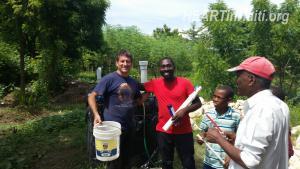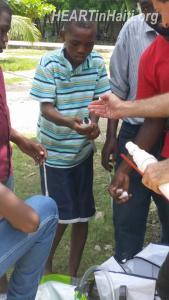Isn’t it heartbreaking to see Haiti so barren, devoid of trees? Deforestation causes:
- Rising temperatures
- Decreasing rain
- Soil in the mountains washing away so much, the rivers run brown
These in turn lead to lack of food and jobs for the people in Haiti. Poverty keeps people dependent on cooking with wood and charcoal, so the trees don’t have a chance of making a comeback.
While the above snapshot of Haiti looks quite grim, we are here to tell you, there is a viable 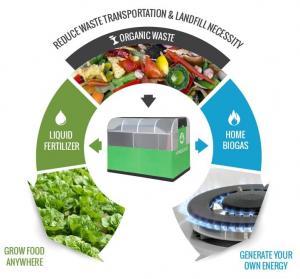 solution to these challenges called biodigestion. Basically, organic waste like food scraps, leaves or grass clippings are put into the biodigester. What comes out is liquid plant fertilizer which helps grow more food and clean cooking fuel to cook the food which is grown. The diagram to the right created by Home Biogas shows you the cycle. At the HEART in Haiti School, we are using a large scale design to produce gas for our school of 124 students, plus faculty and staff to eat two meals a day, 5 days a week.
solution to these challenges called biodigestion. Basically, organic waste like food scraps, leaves or grass clippings are put into the biodigester. What comes out is liquid plant fertilizer which helps grow more food and clean cooking fuel to cook the food which is grown. The diagram to the right created by Home Biogas shows you the cycle. At the HEART in Haiti School, we are using a large scale design to produce gas for our school of 124 students, plus faculty and staff to eat two meals a day, 5 days a week.
In December 2015, we started small with an IBC tank design, which was led by Kathy Puffer of Solar Cities. Kathy recorded the process and educated participants during the build so they can create digesters on their own in the future. In a few weeks, the biodigester started producing clean fuel, which our gardener uses to cook his meals.
In October 2016, thanks to a grant from the Doolittle Foundation, Thomas Henry Culhane, the founder of Solar Cities, lead our team to build a large scale biodigester which will create enough cooking fuel for our HEART in Haiti School Community. Students, staff and community members who assisted with the build are being prepared to spread the word about biodigestion, while creating businesses which provide income for the school and sustainable jobs.
While this build was taking place, teachers were attending a training lead by HEART Education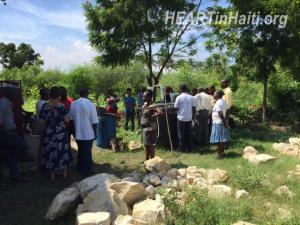 Chair Maxito Sainvil and Board President Maria Blon. The theme of the training was problem solving. The teachers were shown the above picture of Haiti, which was shocking to them because they have never flown over their country. We discussed how biodigestion is a solution to many of Haiti’s problems. The women shared how cooking with wood stings their eyes because of the smoke. Our team of teachers eagerly went to see the biodigester and learn how it is used. They have requested we offer them more training in the future on biodigestion and we are asking the teachers to incorporate this innovative technology in the school’s curriculum.
Chair Maxito Sainvil and Board President Maria Blon. The theme of the training was problem solving. The teachers were shown the above picture of Haiti, which was shocking to them because they have never flown over their country. We discussed how biodigestion is a solution to many of Haiti’s problems. The women shared how cooking with wood stings their eyes because of the smoke. Our team of teachers eagerly went to see the biodigester and learn how it is used. They have requested we offer them more training in the future on biodigestion and we are asking the teachers to incorporate this innovative technology in the school’s curriculum.
Biodigestion gives the HEART in Haiti School the opportunity to save money by producing clean cooking fuel and liquid plant fertilizer from organic waste which previously littered the land. 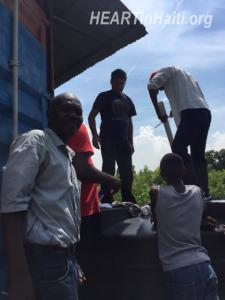 Teaching sustainable ways for the people in Haiti to cook and grow food, which gives the mountains the ability to grow a lush canopy of productive trees is a winning scenario for all involved.
Teaching sustainable ways for the people in Haiti to cook and grow food, which gives the mountains the ability to grow a lush canopy of productive trees is a winning scenario for all involved.
Our wish for this project to continue moving forward is to apply for grant money to purchase a Puxin biodigestion mold, which can make biodigesters in 3 different sizes, depending on the purpose. This investment will be the foundation of a reliable biodigestion business for the school and community.


